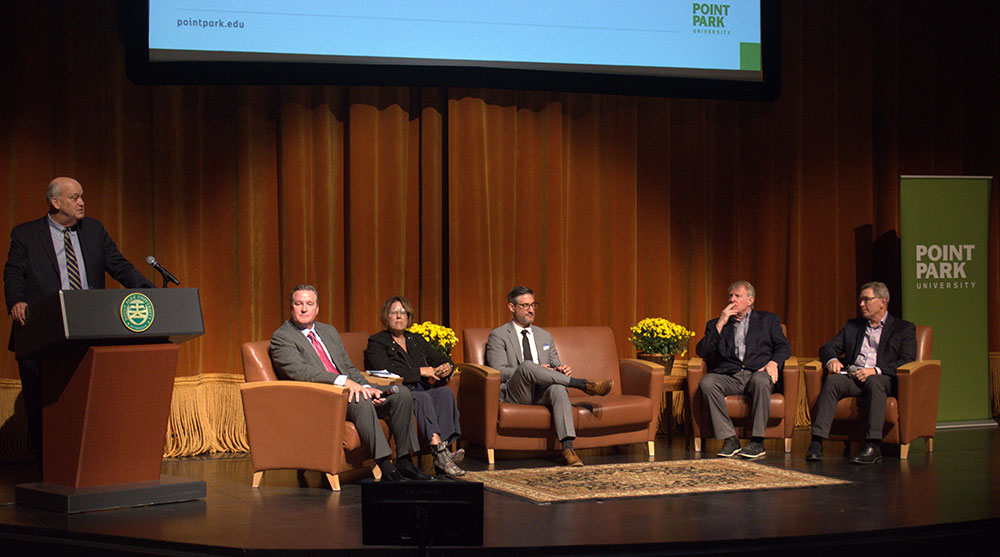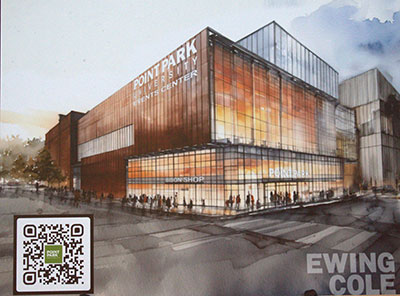Urban Land Institute Proposes Ways Point Park Can Help Revitalize Downtown Pittsburgh Thursday, October 17, 2024

L to R: Bill Flanagan, Ted Black, Audrey Russo, Edgar J. Smith II, Rich Fitzgerald, Dennis Davin. Photo by Chloe Humway '28.
New housing for graduate students, beautifying the Boulevard of the Allies, and a 2,000-seat community events center: all are proposed ideas for how Point Park University can revitalize Downtown Pittsburgh.
On Thurs., Oct. 10, local and University leaders gathered in the Pittsburgh Playhouse to hear the final results of the Urban Land Institute report, which answers the question, "How can Point Park be a catalyst in Downtown Pittsburgh's next great renaissance?"
President Chris W. Brussalis welcomed attendees and laid out the broader vision: "Downtown Pittsburgh's rebirth is on the horizon, and we can make it happen together."
"Our vision isn't just one-quarter of the city," Brussalis said. "It's about creating something that benefits all of Pittsburgh, including the Monongahela side, which is too often left out of too many conversations."
Emily Gaspich, executive director of ULI Pittsburgh, shared ULI's vision for Pittsburgh to transition from a 9-5 city to an 18-hour city, a term that refers to "second-tier" cities that are smaller than the largest markets but still boast many of their advantages.
In a panel discussion moderated by Bill Flanagan, producer and host of WPXI's "Our Region's Business," local urban experts discussed the findings of the ULI report.
Beautifying the Boulevard
Turning the Boulevard of the Allies — known as Pittsburgh's fourth river (of concrete) — into a more inviting space, including traffic-calming measures, is at the top of the list of recommendations.
Ted Black, senior vice president of institutional advancement and strategy, pointed out that in a post-Covid world, the five-lane boulevard is unnecessary.
"The traffic isn't what it used to be, so there's a huge opportunity," Black said.
Rich Fitzgerald, executive director of the Southwestern Pennsylvania Commission, sees the Boulevard as an important part of the revitalization efforts.
"The heart of the Boulevard is going to be this University and the economic growth that occurs around universities and colleges — to build upon the strengths of what this University can be," Fitzgerald said.
Housing Opportunities for Older Students
A second major topic of discussion was adding new housing options that would be well-suited for graduate students.
"There's a lot of real estate that's been rethought," Black said. "One of the things the ULI suggested we explore is for intercollegiate cooperation and collaboration on student housing, which I find fascinating."
The University Line, currently under development with the Bus Rapid Transit project, will create opportunities for older students in Oakland to live Downtown.
Dennis Davin, senior vice president at JLL Pittsburgh, sees the potential the new bus line will open for real estate development.
"The new University Line — that's a pressure relief valve for Oakland," Davin said. "There are so many opportunities to utilize Downtown buildings. Point Park, because they are such a big part of Downtown, because they are such a strength of Downtown, doing something like this is fantastic. It would help the whole Downtown."
A Community Events Center Learning Lab
 The most significant project in Point Park's plans is a proposed 2,000-seat community events center that would serve as home court for Point Park's NCAA DII athletics as well as a live entertainment venue.
The most significant project in Point Park's plans is a proposed 2,000-seat community events center that would serve as home court for Point Park's NCAA DII athletics as well as a live entertainment venue.
Like the Pittsburgh Playhouse, the University would utilize the center as a place to educate students with real-world experience.
Referring to the space around him, Brussalis said, "Students don't just perform here. They immerse themselves daily in mastering the intricacies of both performing and managing a world-class entertainment hub. Just a few years ago, this remarkable venue was merely a concept, and today it stands as a centerpiece of Point Park's commitment to our dedication to innovation. Now I want you to envision a community events center that will serve as our second learning laboratory."
Additionally, from May to August, when classes are not in session, the center could serve the local community similar to a YMCA. Edgar J. Smith II, architect at Ewing Cole, the firm that developed the renderings of the proposed center, sees how this building could support the planned residential growth.
"They're going to build housing here, and there needs to be places to unwind, places to find ways to be part of the athletic community," Smith said. "We need to find ways to offer more recreational opportunities for the people that live there. I think it's important for Point Park in general to find ways to not only be part of the neighbors, the working community, but be part of the greater community."
Audry Russo, president and CEO of Pittsburgh Technology Council and Fortyx80, recognized the forward-thinking innovations that Point Park is already embracing.
"What are our assets, and how do we leverage them?" Russo said. "How do we create collisions around them that extend to ideas we never thought about? Don Marinelli is here trying to levitate the next iteration of entertainment and AI and VR," she said, referring to the new Center for Entertainment Narrative Technology.
In his closing remarks, Brussalis put out a call to action to the local leaders in attendance.
"We need to act with a collective sense of urgency," Brussalis said. "Today is a call to action. It's an invitation for us as a community to begin imagining a new Downtown together. We must ask ourselves, 'What is the future of our beloved Downtown?'"
Read and watch more about the report and panel discussion
Visit the ULI Study page to download the full report, watch the full panel discussion, and read media coverage of the event.

